#The Rime of the Ancient Mariner
Text
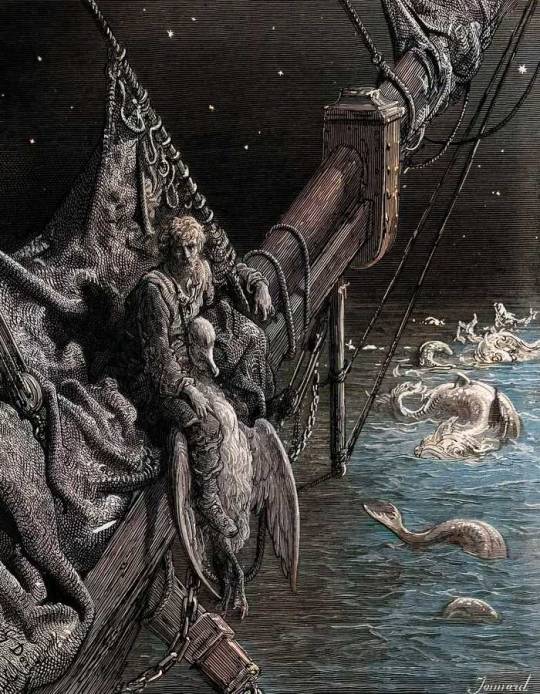
Illustration from 'The Rime of the Ancient Mariner' - The Mariner gazes on the Serpents in the Ocean by Gustave Dore
2K notes
·
View notes
Text
Took me one look at this The Terror poster to know immediately exactly where it's from

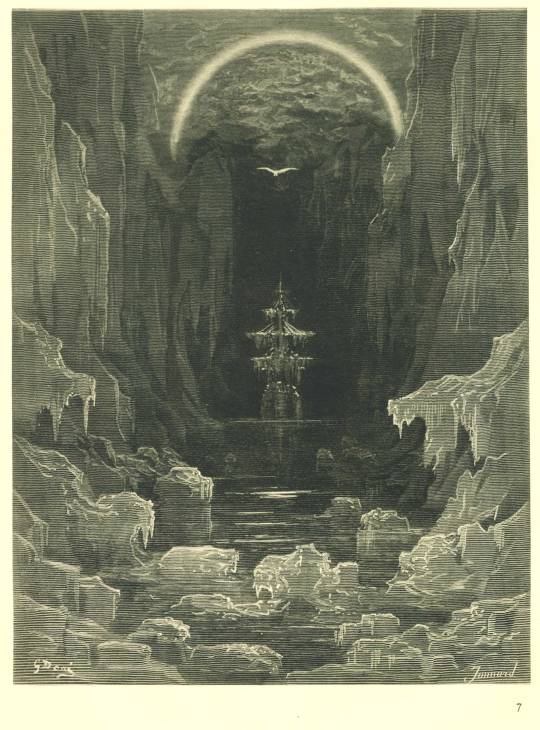
To be more specific, this illustration ties to this exact part of the poem:
And through the drifts the snowy clifts
Did send a dismal sheen:
Nor shapes of men nor beasts we ken--
The ice was all between.
The ice was here, the ice was there,
The ice was all around:
It cracked and growled, and roared and howled,
Like noises in a swound!
#also the whole downward spiral of horror in both stories starts with a murder of an innocent & ends with a sole survivor living in death#the terror#the terror amc#the rime of the ancient mariner#samuel taylor coleridge#gustave doré
716 notes
·
View notes
Text

Hi, I’m new here. Here’s a little ship with some tall icebergs.
#the terror#the rime of the ancient mariner#polar exploration#polar history#age of sail#maritime#sailing
380 notes
·
View notes
Text

"The game is done! I've won! I've won!"
Gerald Fenwick Metcalfe (1890-1930) - The Rime of the Ancient Mariner
Illustration from "The Poems of Coleridge", 1907
#gerald fenwick metcalfe#the rime of the ancient mariner#samuel taylor coleridge#life and death#victorian gothic#story illustration#art#illustration
206 notes
·
View notes
Photo
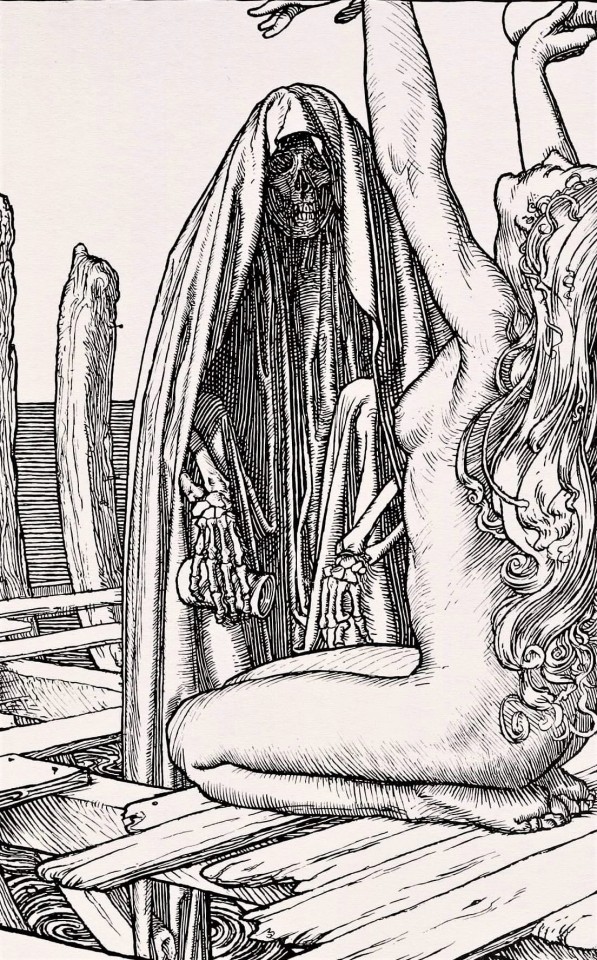
#the rime of the ancient mariner#samuel taylor coleridge#art#drawing#illustration#books#gerald fenwick metcalfe
439 notes
·
View notes
Photo
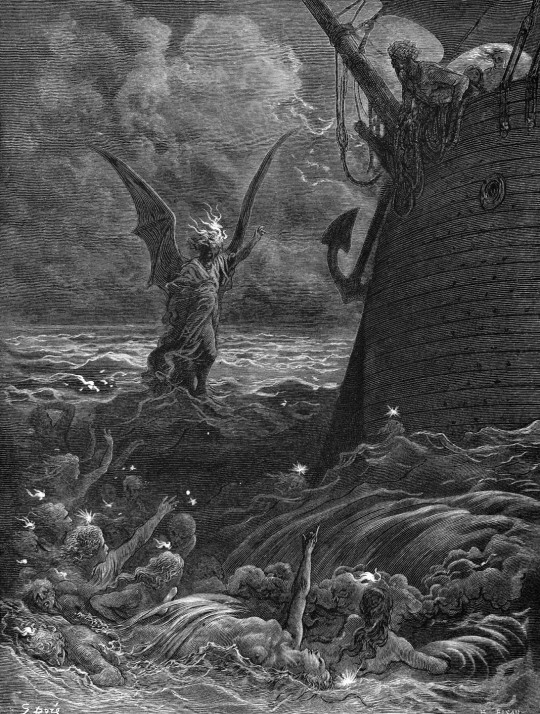
About, about, in reel and rout, The death-fires danced at night., from Samuel Taylor Coleridge’s The Rime of the Ancient Mariner by Gustave Doré (1877)
#gustave doré#art#illustration#golden age of illustration#19th century#19th century art#vintage art#vintage illustration#vintage#french art#french artist#books#book illustration#the rime of the ancient mariner#samuel taylor coleridge#poetry#poetry art#classic art
1K notes
·
View notes
Text

#the rime of the ancient mariner#samuel taylor coleridge#poetry#ballad#book poll#have you read this book poll#polls
59 notes
·
View notes
Text
The Rime of the Ancient Mariner and parallels in OFMD
2.7k word meta
If you haven’t read my other post about why I’m talking about albatrosses in the first place, read the first part of this and come back! All of this will make the most sense if you read all of the parts I’ve written – I’ve split them up for ease of reading, because holy shit this is long.
TWs: animal death, blood, eating animals, starvation, emotional abuse, physical abuse, gunshot injuries, suicidal ideation, canon-typical mental health problems
MAJOR OFMD SPOILERS THROUGH S2E03
------------------------------------------------------------------------------
Let me start out by saying that yes, this is anachronistic – this poem wasn’t written until 1798. I also don’t care: Oluwande is wearing crocs, Stede’s “corpse” is crushed by a piano whose maker won’t exist until 1863, Blackbeard’s got his whole leather-daddy getup, Zheng Yi Sao won’t be born until 1775 – OFMD plays fast and loose with historical accuracy, and I am never going to dismiss an OFMD theory because the timeline doesn’t match up :P
Now that that’s out of the way, a little bit of background information. Long summary incoming.
The Rime of the Ancient Mariner is a poem written by English poet Samuel Coleridge. The story is told through the words of the mariner, who has recently survived some horrifying ordeals, soon to be told to a poor unsuspecting stranger who just wants to attend a wedding. As the story goes, the mariner set out with his crew of 200-some-odd men, and everything’s going just peachy until some storms pick up and drive them toward the South Pole. Stranded and lost, the crew fear for their lives, until an albatross appears. At the same time that the albatross appears, the storms clear, the helmsman is able to make their way through the ice of the South Pole, and a southern wind picks up, pushing them back north. The albatross follows the ship, but the mariner believes that it is somehow responsible for the mists and fog that now surround the ship, so he shoots the bird with his crossbow. At that point, the fog and mists actually do clear up (by coincidence or otherwise) – and the crew praise the captain for taking down the bird.
But it’s a fickle crowd – soon the wind stops blowing, and the ship is becalmed; the crew blame the Mariner for killing the bird that had been their good luck. They sit in the middle of the ocean for days or weeks, dying of thirst. They cannot even speak, they’re so thirsty – but they make sure that the Mariner knows that he is to blame for this by tying the albatross’s body around his neck and forcing him to wear it like a grotesque necklace. Eventually, everyone on the ship except the Mariner dies (there’s a bit here about Death and Life-in-Death rolling dice to see who lives and who dies – the important part is that none of the crew survives).
Finally, the Mariner is left alone on his ship of corpses, which strangely do not smell or rot. He wishes he could die, but he doesn’t. During this time, he begins to appreciate what there is left to appreciate – the life around him in the ocean, in the air, “all things both great and small” – and the curse is lifted from him. The albatross detaches from around his neck and sinks into the ocean.
From this point on, the story goes about as you’d expect – the curse being lifted, the wind picks up again, setting the Mariner speeding back home (though, perhaps unexpectedly, his crew gets to come back as zombies for a short while to man the ship until it reaches land again, at which point they die again. RIP). As the ship is coming upon the Mariner’s homeland, it sinks like a rock to the bottom of the ocean – a hermit happens to see the Mariner floating out there and comes to pick him up, thinking he’s dead. When the Mariner opens his eyes, the hermit believes him to be the Devil himself (I mention this only because I think the wording of “Demon? I’m the fuckin’ Devil” lines up perfectly with this).
As penance for shooting the albatross (as if all of this so far wasn’t enough), the Mariner spends the rest of his days wandering the earth, telling his story and making random wedding-goers sad.
HOO BOY, that was a lot. (A whopper, one might say.) Thanks for sticking with me so far.
Now, some of the parallels between this poem and the events of OFMD are more neat and tidy than others are. The biggest parallel, obviously, is the link between the albatross and the “impossible birds” that Ed references in S2E01 – the entire reason I started reading this poem to begin with. The links between the show and the poem are not ones that I think the characters in the show (Ed) are consciously making. I think these allusions more reflect the themes and symbols that the writers and directors want us as the audience to pick up on. Therefore, the “impossible birds” conversation in canon is not talking about albatrosses in the sense that they are commonly referenced in literature, as the proverbial weight around one’s neck that represents guilt – but we can still talk about that symbolism outside of canon.
And talk about it I will.
For those of us who have watched the show, it probably goes without saying that Ed’s got a fair amount of guilt, shame, psychological trauma, etc. that he carries around with him. So if we’re going to invoke the albatross metaphor following S2E3, what specifically can we say is Ed’s “albatross?” There are a few candidates that immediately come to mind. It could be his guilt surrounding a) his father’s murder; b) Lucius’s attempted murder; c) the abusive, toxic relationship that he carried on with Izzy; or maybe even d) himself.
That last one is a little esoteric, so let me explain. Ed hates himself – aside from all the self-destructive tendencies as evidence, he admits it out loud in his dream with Hornigold in S2E03. I wonder if the albatross that is hanging around Blackbeard’s neck is Edward – the real Edward, the one that is more than just his fame, his terrifying persona, his violence-as-a-form-of-love tendencies – the Edward that Stede fell in love with. I wonder whether Ed’s guilt surrounds more than just how he’s hurt others, but how he feels he has killed a truer, better version of himself, and that he can never regain it. In line with The Rime of the Ancient Mariner, killing this “albatross” of a better Edward didn’t just kill him – it killed everyone around him as well. And now, after he has borne the blame of others for having gotten them into this situation, he is forced to wear…himself. The guilt that weighs him down is the knowledge that there is a version of him that was loved, that Stede loved, and in his eyes, he has killed that version of himself.
I want to take a moment to acknowledge a post (or several posts) that I saw several months back in relation to season 1. In these posts [Link1, Link2], smarter people than me drew a connection between a metaphorical albatross and the black cravat that Stede gives to Ed – and that Ed continues to wear until he and Stede change into their privateering academy garb. Something both of those posts touch on is how the cravat represents Stede, and I think that is completely true; however, I posit that the cravat represents the fact that Ed is lovable.
Something that’s been pointed out in the past 48 hours since these episodes dropped is that Ed is not wearing the cravat during the first parts of season 2. Only when he essentially decides to kill himself via storm do we see him once again wearing the cravat (the cravat is also noticeably absent from the purgatory dream sequence).
What exactly this means is still shaky to me – in my mind, Ed does canonically see the cravat as a reminder of his “real” self, and he puts it away and tries to hide it while he’s still…well, functioning is far too strong of a word, but at least not actively suicidal like we see at the end of episode 2. I think hearing Izzy supposedly shoot himself is what pushes Ed over the edge into being actively suicidal; perhaps at this point, some part of Ed is still hoping against hope that he can convince himself not to do it, to wait for Stede. Alternatively, it may be that if he dies here, he wants to take the idea of a “better him” with him.
In the sense of the cravat representing the albatross (meaning the cravat presence is not a choice of the characters, but of costume design), the cravat being missing during the batshit-insane-high-on-rhino-horn Kraken era may represent him not actually feeling the guilt of losing himself during this time. He may have actually convinced himself that a lovable version of himself never existed, and he’s living guilt-free. The guilt comes back when he hears Izzy shoot himself – he’s reminded that he caused this by killing a version of himself that Izzy trusted and even loved, in his own fucked-up way. From then on, the cravat is back on – the guilt is back, and it’s strong enough to induce the kamikaze-type rage we see in the storm.
(Important to note here that while I stand by this interpretation, I’m not sure how it fits with the fact that Ed is wearing the cravat just after the Krakening – the moment when he’s looking back on the island that he just abandoned the Revenge crew on in S1E10.)
I’m leaving this one for myself to come back to later on the off-chance I have some sort of epiphany.
Oh wow, you’re still here?? Probably time for a water break. Go on, the rest will be here when you get back. And there’s unfortunately quite a lot more that still needs to move from my brain to this Word doc.
Ready? Ok.
So that’s one possible interpretation of what Ed’s “albatross” is – I won’t spend time on other possibilities because what I’ve laid out here is the interpretation that I most strongly subscribe to. But all that is only really addressing one part of The Rime of the Ancient Mariner. Granted, it’s the most important part, symbolically, but there are some other parallels that I want to address that together convince me that the writers of OFMD are actually, specifically referencing this poem.
Obviously, there’s a parallel in that both the happenings of the poem and OFMD occur on actual, physical ships, captained by the man who ends up “shooting the albatross” and being rightfully blamed for it. Both of these ships suffer because of the dead albatross – physically, both ships are taken through devastating storms, and both ships are falling apart. The ship in the poem stops moving indefinitely because of a becalming (all wind and ocean currents stopped); the Revenge stops moving indefinitely because Ed removes the wheel. Both ships suffer casualties – in the poem, everyone dies, and on the Revenge, those crew members may be physically alive, but they are haunted by it. The poem makes note of the fact that the crew died of thirst – while this doesn’t seem to be a main concern on the Revenge, the show does show us, rather graphically, that they were beginning to starve, having to catch and eat raw seagulls to survive (note that dead birds are also a recurring theme in OFMD, leading me to believe even more that albatross references are intentional).
There’s an interesting pattern in the poem concerning dead people – specifically, how they don’t seem to be entirely dead at first. Firstly, the crew that die of thirst drop dead, one by one, on the deck of the Mariner’s ship. However, the poet notes that the bodies did not decompose or smell. Later, these bodies are resurrected by whatever sea spirit chooses to spare the Mariner’s life, using the bodies to man the ship and sail it back to shore. When they are done with this, they drop dead once more, staying on the ship as it sinks to the bottom of the ocean. When the hermit finds the Mariner floating in the ocean, he thinks him dead, before the Mariner’s eyes shoot open (similar to a certain someone at the end of S2E03).
In season 1, I can’t think of any instances wherein someone was presumed to be dead, but actually wasn’t, aside from Stede’s fuckery. However, this theme has come up at least 3 times in season 2 so far: Lucius being the obvious one, then Izzy, and finally Ed himself (and if I’m understanding correctly, Ed was actually, literally, cold-in-the-ground physically dead, not just “presumed dead.” This might be clarified in a future episode). That seems…intentional.
Side note: how long was Ed supposed to have been dead? Days? Didn’t anyone notice that he wasn’t, like, rotting? Especially when “the smell of rot” has been something that very consistently shows up in the show when it’s relevant (see: Lucius’s finger infection, Ed being able to smell Izzy through the walls of the ship).
One more thing: the last thing that the Mariner sees when leaving the shore, and the first thing he sees when he gets back? A lighthouse. Now, could that just be a coincidence, with lighthouses being a very common image in sea-based stories? Sure. But I’m choosing to believe that this poem was chosen (and yes, I say chosen – as in the writers took inspiration from this poem) specifically because it has so much imagery in common with OFMD.
These are admittedly tenuous links between the poem and the show, but they are links, so I’m including them.
The last thing I want to mention about this poem is how its “moral,” if it can be said to have one, is to treat living things with respect – you as a person do not live in a vacuum, and your actions have consequences for others, not just yourself. And I think this sentiment lines up incredibly well with a line that Jim has in S2E02:
…
There was a time when life meant something on this ship. When we lived for each other.
…
According to Jim (and according to literally everything the show has been telling us), the ship was a safe place when the people onboard cared about each other. Fang mentions that Blackbeard didn’t even react when Ivan died; Blackbeard callously shoots his first mate, with the intent of having him killed; he doesn’t even care about his own life and whether he lives or dies. Just like in the poem, this is the issue that needs to be resolved in order for the curse to be lifted – the Mariner (Ed) needs to rekindle an appreciation for life. In the poem, this is a simple “every living thing is special” kind of epiphany – I get the feeling it’s going to be a much more complicated journey in OFMD, especially since the show as a whole is somewhat irreverent concerning the deaths of non-recurring characters. For Ed, I imagine it’s going to be more of an appreciation for his own life – not the value of life on the whole, but the value that his life holds.
So. That’s a lot of words that I just typed – I’m hoping at least some of them made sense. Huge thank you to anyone who made it this far! This is all I’ve got on this particular poem, but I’ve still got more things I want to say about another poem called L’albatros (Charles Baudelaire) and how it relates to Ed and his perception of himself. It’s a huge stretch to say that this poem exists in-universe and Ed has read it, but it makes sense to me and I want to get my thoughts down on (virtual) paper – I’ll link to it in the original introductory post (link to that at the top of this post!).
Let me know what you think!! This silly, stupid pirate show will be consuming my thoughts for at least the next several months, and I’m dying for some reciprocal opinion/info-dumping. Inbox is open!
#ofmd#our flag means death meta#our flag means death#ofmd meta#ofmd s2 meta#ofmd s2#ofmd s2 spoilers#ofmd spoilers#ofmd blackbeard#ofmd season 2#ofmd season 2 spoilers#literary analysis#meta#stede bonnet#izzy hands#impossible birds#albatross#the rime of the ancient mariner#poetry#lucius spriggs#jim jimenez
93 notes
·
View notes
Text
I don't know but for some reason in Dracula, Jonathan saying
But I am not in heart to describe beauty, for when I had seen the view I explored further; doors, doors, doors everywhere, and all locked and bolted. In no place save from the windows in the castle walls is there an available exit.
Reminds me of "Water, water, every where, And all the boards did shrink; Water, water, every where, Nor any drop to drink." from The Rime of the Ancient Mariner.
87 notes
·
View notes
Text
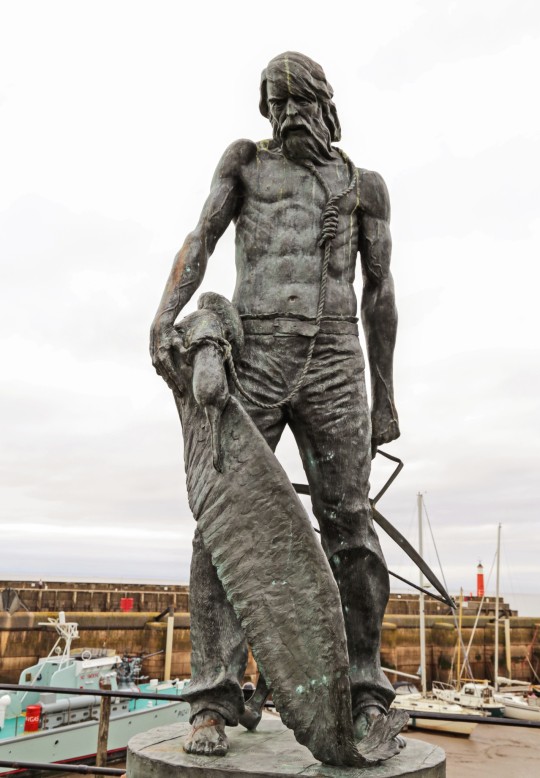
Bronze statue of the Ancient Mariner in the bay village of Watchet (Somerset, England). Designed and created 2003 by Alan B. Herriot.
#ah well a day what evil looks had i from old and young ⚓ instead of the cross the albatross about my neck was hung!#2000s#art#sculpture#poetry#lit#the rime of the ancient mariner#samuel taylor coleridge#academia#18th century#literature#culture#books#england#statue#dark#icons#people#marine life#alan b herriot
45 notes
·
View notes
Text
Ah, the importance of local journalism! Our correspondent covering the weekend news in Whitby is full of news about the extraordinary storm that brought in the Demeter, ‘as idle as a painted ship upon a painted ocean.’
Now. We know that our correspondent, besides being a fairly good runner, has a taste for flowery description and literary allusion, like many another Victorian journalist. But this line of poetry is not merely proving his education. It is taken from Coleridge’s Rime of the Ancient Mariner. And The Rime of the Ancient Mariner is about a ship which is pursued and haunted by an evil spirit, in which corpses are reanimated, and in which evil has power that even the wind and the waves obey. The thing which pursues the ship brings death, and madness, and things worse than both.
#dracula daily#angst and literary allusions#bram stoker#not normal even once#the rime of the ancient mariner#the very deeps did rot: o christ! that ever this should be!
528 notes
·
View notes
Text
⚓Boat Media Tournament⚓
Semifinals, match 1

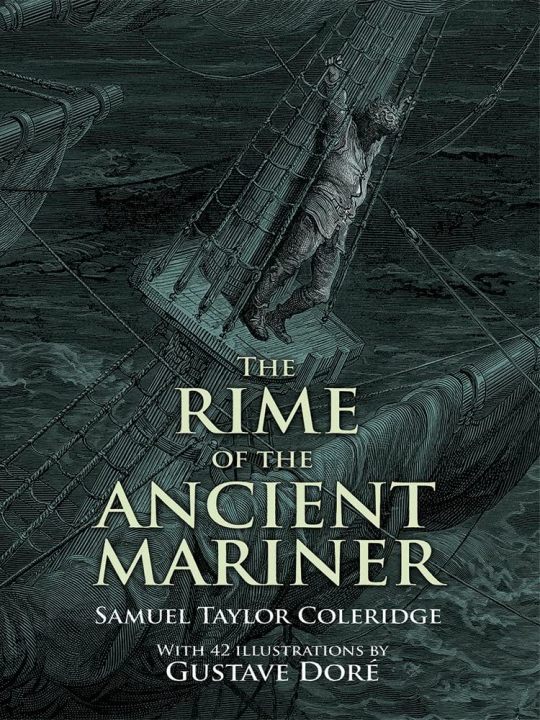
#bmt2 polls#bmt2 semifinals#boat media#boat media tourney#the odyssey#the rime of the ancient mariner
129 notes
·
View notes
Text
Can all my literary girlies gather together for a final prayer that 'The Albatross' is somehow an allusion to THE tortured poet himself, Samuel TAYLOR Coleridge? 🕯️🙏🕯️
(if you have heard the leaks, PLEASE do not comment on this. Let me dream for a few more hours 😭😭😭)
#morgan rambles#my ramblings#taylor swift#the tortured poets department#samuel taylor coleridge#rime of the ancient mariner#the rime of the ancient mariner#the albatross#romantic poetry#british romanticism#ttpd#poetry#lit major#literature#british literature
16 notes
·
View notes
Text
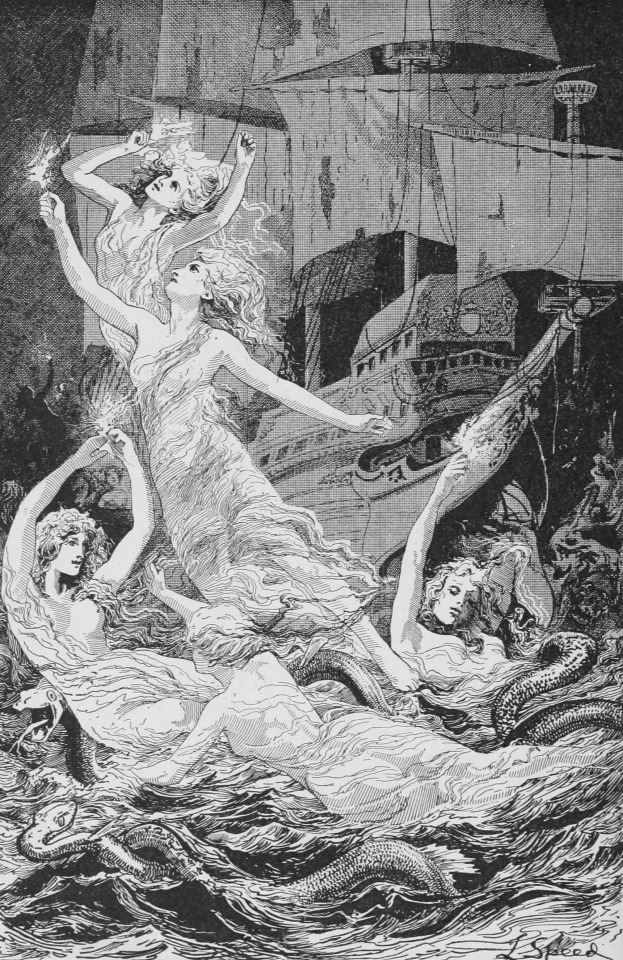
"The death-fires danced at night." - S. T. Coleridge
Lancelot Speed - The Rime of the Ancient Mariner
(The Blue Poetry Book, 1912)
#lancelot speed#the rime of the ancient mariner#samuel taylor coleridge#art#spirits#illustration#the blue poetry book#horror art
481 notes
·
View notes
Text
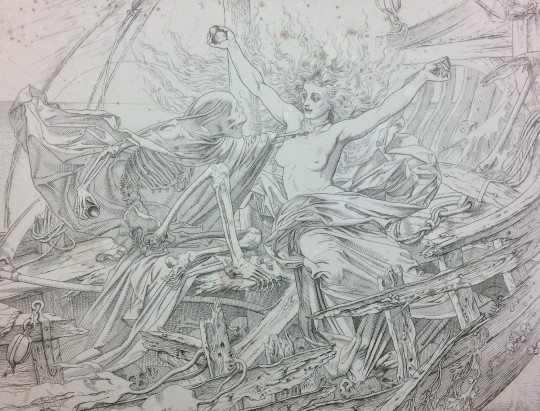
#the rime of the ancient mariner#joseph noel paton#samuel taylor coleridge#allegory of death#triumph of death
152 notes
·
View notes
Photo
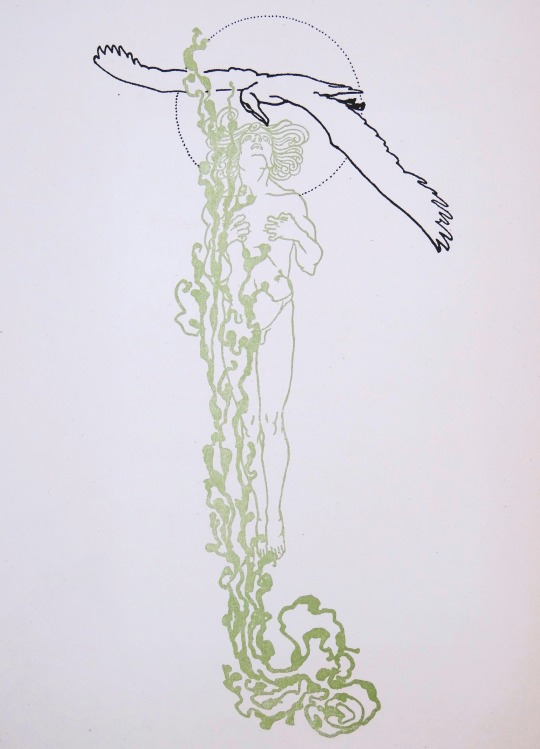
“When looking westward, I beheld a something in the sky.” from Samuel Taylor Coleridge’s The Rime of the Ancient Mariner by Willy Pogany (1910)
#willy pogany#art#illustration#art nouveau#1910s#1910s art#vintage art#vintage illustration#vintage#hungarian art#hungarian artist#books#book illustration#samuel taylor coleridge#the rime of the ancient mariner#golden age of illustration#classic art
662 notes
·
View notes